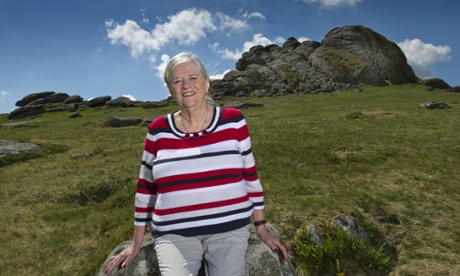
Happiness is best defined by its antonym, which is less “unhappiness” than “anxiety”. Anyone who is not oppressed by intolerable worry or grievous pain is almost certainly happy, whether rich or poor, well or ill, successful or frustrated. When we have been ill, we rejoice in the freedom that the restoration of health brings, and when we have been tormented by worry we relish the return to mental peace. So happiness is a combination of stability, order and absence of serious worry.
On that definition I have been happy most of my life, even in times of trial, but the great difference in retirement is that I notice I am so. There is nothing like a long, breezy walk on Dartmoor to make me feel I have arrived in heaven. The beauty of creation is all around and I feel closer to the creator Himself.
Feeling closer to God is easier when you are not bombarding Him with petitions or throwing together a prayer between the sound of the alarm and arriving at the studios of the Today programme. At this stage of life the certainty of redemption is a bit more soothing than confounding Dennis Skinner in rowdy debate.
Satisfaction is a major player in the happiness stakes. Wilberforce would have been happy when slavery was abolished, Churchill when Germany surrendered, Blair when he broke 18 years of Conservative rule, Pasteur when he discovered the process to which he gave his name, Fleming when the mould finally became a medicine.
That much is easy to understand. Less easy is the happiness of martyrs, yet beyond doubt in the midst of suffering there can be happiness. St Paul was satisfied rather than ecstatic when he had fought the good fight, kept the faith and finished his course, but he was happy.
For most of my political life I was not ecstatic but I was happy because I had huge confidence in the causes I espoused and the work I was doing. Even under extreme pressure I was satisfied that I was fighting a good fight.
Simplicity is another feature of happiness: the enjoyment of childhood innocence before it becomes teenage angst, a pause to admire a tiny flower blooming in an unlikely place, the magnificence of a sunset, the sudden easing of a mild pain, the sound of waves on the shore, the dawn chorus, stars shining hard and bright, sunshine on frost, the antics of a pet, a rainbow, a funny shape in a cloud, a crackling fire. The joy of these is the greater now that I have time to stand and stare and savour. These days I am at my most content when pottering among my gnomes and lupins with the waterfall on the pond providing a peaceful background sound.
It is a truism that money cannot buy happiness. Love, youth and health are not for sale. It is the absence of anxiety about any or all of those that can be a measure of happiness. I may be single, old and starting to creak a bit but I am still happy because I am not fraught by fading love, resentful of lost youth and vigour or plagued by pain.
I gave up a very long time ago trying to convince anybody that living alone is a source of happiness. One of my friends recently wrote in a review of my autobiography that he and many others would be so happy if I were suddenly to find love. Yes, but I wouldn’t be. The last thing I want is emotional upheaval and the demands of another person ruining my hard-earned tranquillity, but the only people who understand that are those who share my own feelings on the subject.
“I like living alone,” mused a divorced friend recently and I bit back a reminder of her utter incomprehension that I was always thus happy. I did not set out to stay single but gradually came to the active realisation that it was a source of contentment.
For me happiness is also cat-shaped, but alas my current lifestyle, involving frequent absence from home, precludes sharing it with a furry, purry being or two. However, I am happy knowing that the time will come when the patter of four feet and a purring lump on the duvet will once more be a normal part of domestic life.
The grief of loss is always softened by the continuation of life, so although I still miss my parents and brother, and rarely a day passes when I do not think of them, I rejoice in the latest generation. Undeniably a major contribution to my happiness comes from the love and visits of five great-nieces and nephews, ranging in age from three to 10.
Mens sana in corpore sano is still a good recipe for being glad to wake each morning, but never more so than when the spirit is happy and healthy too.
Ann Widdecombe’s latest novel is The Dancing Detective

